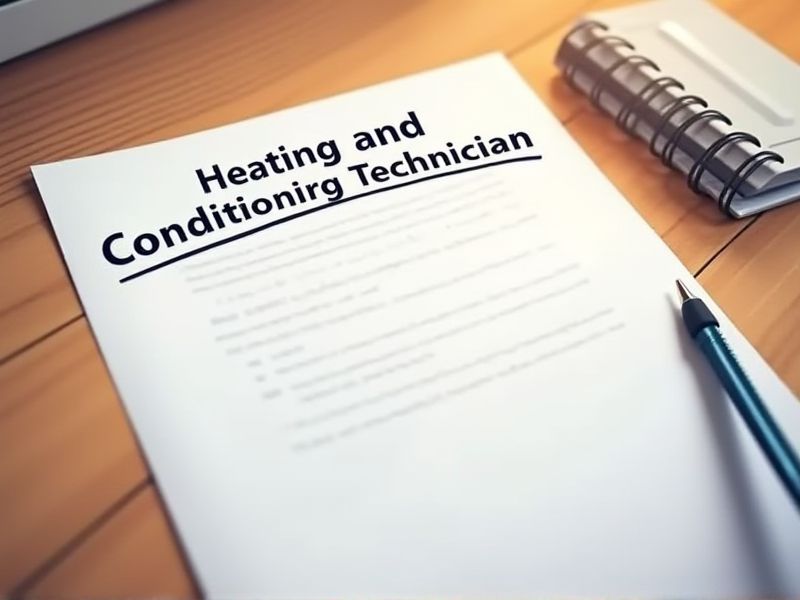
Heating and air conditioning technicians work to ensure system performance and safety, which directly impacts indoor air quality and energy efficiency. Due to advancements in HVAC technology and evolving safety standards, obtaining specific certifications helps technicians stay competent and compliant. These certifications validate a technician's expertise, making them more attractive to employers and providing assurance to clients. Here are some important certifications a Heating and Air Conditioning Technician may need.
EPA Section 608 Certification
EPA Section 608 Certification is mandated due to the Clean Air Act, which aims to minimize the release of ozone-depleting refrigerants into the atmosphere. Heating and Air Conditioning Technicians require this certification to legally purchase and handle refrigerants. The certification ensures technicians possess the necessary knowledge to handle refrigerants responsibly, reducing environmental harm. Without it, technicians face penalties and restrictions, limiting their professional capabilities and marketability.
NATE Certified Technician
Hiring a NATE Certified Technician ensures that the professional has demonstrated comprehensive knowledge in the HVAC industry, enhancing the reliability of installations and repairs. The certification process involves rigorous testing, which results in fewer mistakes and reduces future maintenance costs for homeowners. NATE certification is associated with higher service quality, leading to improved energy efficiency and performance for heating and cooling systems, which lowers utility bills. For businesses, employing certified technicians can enhance customer satisfaction and increase repeat business, solidifying the company's reputation in a competitive market.
HVAC Excellence Certification
HVAC Excellence Certification validates a technician's knowledge and skills, leading to better employment opportunities and career advancement in a competitive industry. This certification enhances the credibility and trustworthiness of technicians, which can lead to increased customer trust and satisfaction. Employers often prefer certified technicians because they tend to have a higher level of expertise and commitment to quality service. Certified technicians are more likely to stay updated with industry standards and technological advancements, ensuring they provide efficient and safe solutions.
RSES Certified Refrigeration Technician
The RSES Certified Refrigeration Technician provides specialized knowledge in refrigeration systems, which enhances understanding and skill in HVAC tasks. Proper certification ensures compliance with safety standards and regulations, reducing the risk of equipment malfunctions and accidents. Certification validates a technician's expertise and can lead to greater customer trust and satisfaction. Advanced refrigeration training can lead to improved diagnostic capabilities, resulting in more efficient repairs and installations.
Universal EPA Certification
Universal EPA Certification is mandated to ensure that technicians can handle refrigerants safely, minimizing environmental harm caused by ozone-depleting substances. Regulations require certified handling skills to prevent accidental leaks and release of harmful chemicals. Proper certification ensures adherence to laws that protect both environmental and human health. Technicians with this certification can work across all refrigerant systems, broadening their job opportunities and flexibility.
OSHA 10-Hour Construction Safety Certification
Heating and Air Conditioning Technicians often work in environments where they face risks like electrical hazards and confined spaces. The OSHA 10-Hour Construction Safety Certification provides essential training to identify and mitigate these risks. With proper safety training, technicians can reduce workplace injuries, enhancing job site safety standards. Furthermore, compliance with safety certifications can lead to improved job opportunities and industry credibility for technicians.
Building Performance Institute (BPI) Building Analyst Certification
Obtaining the BPI Building Analyst Certification equips heating and air conditioning technicians with the skills to conduct comprehensive energy audits, improving the efficiency of HVAC systems. This certification enhances the technician's credibility by demonstrating proficiency in identifying and addressing energy inefficiencies. Employers often prefer certified technicians as they bring a standardized approach to optimizing building performance, leading to cost savings for clients. With the increasing focus on sustainable practices and energy conservation, this certification opens up more job opportunities in the industry.
LEED Green Associate Certification
Gaining a LEED Green Associate Certification can enhance a Heating and Air Conditioning Technician's understanding of sustainable building practices. This knowledge broadens their ability to design and install energy-efficient HVAC systems that align with green standards, reducing environmental impact. As the demand for sustainable buildings rises, technicians with this certification become more competitive in the job market. Employers seeking to meet green criteria are more likely to hire certified professionals to ensure compliance with environmental standards.
HAZMAT Handling Certification
Improper handling of hazardous materials, including refrigerants, can pose serious health and environmental risks, making HAZMAT Handling Certification crucial for HVAC technicians. The certification ensures that technicians are aware of and comply with safety regulations and procedures. Failure to handle these materials correctly could result in harmful chemical leaks and regulatory penalties. Certification also enhances technicians' credibility and employability within the industry.
ACCA Certified HVAC Designer Certification
The ACCA Certified HVAC Designer Certification provides validation of a technician's comprehensive understanding of HVAC systems, which can lead to increased job prospects. Certification demonstrates a mastery of industry standards and best practices, ensuring systems are designed with optimum efficiency and safety. This credential can build trust with clients and employers, enhancing marketability in a competitive job market. As HVAC systems become more complex, having this certification can be pivotal in keeping up with technological advancements and regulatory changes.
Summary
When you obtain certifications as a Heating and Air Conditioning Technician, your credibility in the field increases significantly. This often leads to better job opportunities and potential salary hikes due to recognized expertise. Certified technicians are more likely to gain trust from clients, resulting in increased demand for services. Employers may also favor technicians with certifications for specialized projects or tasks.
